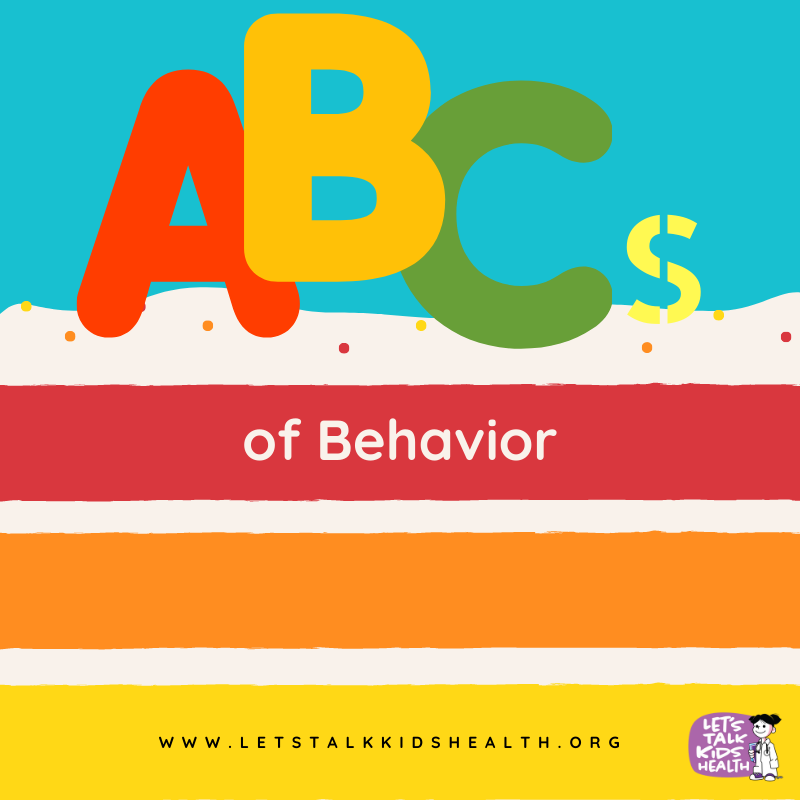The Case for Behavioral Therapy: Sooner than Later is Best
Jul 09, 2021
When children have behavior challenges, it is often VERY stressful for parents, siblings, peers and teachers. Misbehavior can lead to calls from daycare or school to pick up the child early. It can also lead to suspensions or expulsions if the child’s behavior is potentially harmful to themselves or others and distracts from educators being able to focus on teaching.
It is important to emphasize that when these issues come up, your pediatrician wants to help and support families. However, there is never a simple quick fix to this scenario.
What Pediatricians Want to Know: The ABCs of Behavior
Pediatricians will want to understand how long the misbehavior has been an issue by asking questions about when it started, if there were any changes in your family’s life that occurred right before, how often it happens, how severe it is and whether it happens at home and school. They will want to know the misbehavior affects you and the family unit and how you are coping. They will usually ask about what techniques you have tried whenever your child has the misbehavior and why you think these techniques may or may not be useful.

All of these questions help the pediatrician understand the “ABCs” of behavior. In other words, what triggers the behavior (ANTECEDENTS), the details of the concerning behavior (BEHAVIOR) and how you usually handle the situation (CONSEQUENCE).
Keeping a behavior log of the ABCs of problem behaviors is helpful because together you can talk about your concerns and sometimes talking aloud can help parents and the pediatrician understand the ABCs. Sometimes this can lead to thinking about how to prevent or defuse the situation.
Sometimes your pediatrician may want you to see a specialist for help. This might mean a referral to see a developmental-behavioral pediatrician, psychiatrist, psychologist, or behavioral therapist. Or it could mean a sleep doctor, neurologist, geneticist or another specialist. Sometimes, more than one referral is made. It will all depend upon what underlying causes or issues they would like to know more about. If and when this happens, please make sure to ask your child’s doctor the reason for the referral so you can feel comfortable meeting a new member of your child’s “team.” It can be frightening to think about re-hashing all the details about your child’s misbehavior to different doctors or therapists. However, it is important that parents have an understanding about why the referral is needed and what the pediatrician hopes to gain from the consultation appointment. I think this is an easily and often overlooked point of discussion. However, it is easier for parents to make sure their child doesn’t miss these important appointments when they understand why the pediatrician feels it is necessary.
Why pediatricians may prescribe behavioral therapy
Behavioral therapy is a KEY treatment for many childhood behavioral and mental health issues. It is recommended as the first-line treatment for children less than 5 years of age but, also often prescribed at the same time as medication.
WHY?
Simply put, medicine may lessen the severity and frequency of the misbehavior, but it does not teach the child anything. When parents rely solely upon medicine for treatment, we lose precious time to work with the child and the parent(s) to learn skills they need to succeed without the medicine.
Medicines may cause side effects. Sometimes the side effects happen commonly that they can coach the parent on what to watch for and how to handle them if they are to happen. Some side effects are more concerning and again, the doctor can coach parents on what to do if these more serious side effects happen. However, I know most parents would rather not use medicines if they didn’t have to.
Medicine for child behavioral challenges is never intended to make them a “zombie.” It is meant to lessen the behavioral symptoms that cause the child problems in home and school. Symptoms such as moodiness or irritability, impulsivity, or inattention and aggression are among those that cause concern for the child and others.
While medicines can help, behavioral therapy is important because it focuses on helping children (and their parents) learn valuable skills to manage and change behavior, including how to improve interactions with each other.
As you might suspect, behavioral types of treatment are not magic and require a commitment and time to going to multiple appointments. Sometimes these therapies are done one-on-one with a therapist or sometimes delivered in group.
It is important that parents of young children understand that behavioral therapists will often work directly with the parents themselves rather than focusing on the child to help them learn parenting techniques. This is because parents play an important role in monitoring and responding to their child’s behavior. Sometimes parents question time spent going to therapies that don’t specifically work with the child and instead focus on them. Parent training IS effective especially in helping improve parent-child interactions.
Why focus on the parents?
Sometimes this is mainly due to the child age and their level of understanding. Often times, parents must be the first ones to change how they respond to a problem behavior, especially those that occur again and again, if the dynamic is going to shift. Parents can expect learning strategies to help them manage their child’s behavior by setting limits, being consistent and learning effective and positive ways to strengthen the parent-child relationship. Parents will also learn how to communicate with their child and adjust expectations based on the child’s developmental level.
When working with a behavioral therapist, you can expect to have an “intake” appointment so the therapist has a firm understanding of the context of the behavior, including family dynamics and parents’ concerns. Parents should feel able to ask the therapist the following:
- expected length of therapy
- how the therapist will measure the progress made between sessions
- what needs to be accomplished before therapy is considered a ‘success’
- expectations for each visit (will the therapist observe the parent-child together, work solely with the parent, if other adults who help care for the child able to join)
- whether the therapist will work with the school/daycare
- what reports can be left for the parent after each session so it can be shared with the child’s pediatrician
The difference between parent-focused and child-focused behavioral therapy
Parent-focused behavioral therapy is most effective with parents of children 8 years of age or younger. However, if a child is participating in child-directed therapy, parents should expect to have a “check in” with the therapist for updates and may even have a few joint sessions with their child. Child therapies often focus on teaching social skills, self-reflection and problem solving and conflict resolution.
Sometimes, child-directed therapy is offered at school. However, school-based therapy means that parents might have to take a more active role to stay involved in the process. If your child is offered school-based therapy at the recommendation by a teacher, counselor or school administrator, make sure you know the name of your child’s therapist, how often he/she meets with your child, what the goals are, how the therapist will share updates with you and the teacher, and how to contact the therapist with your concerns.
Remember, you and your child may benefit from more than one type of therapy.
RELATED: How Does Behavioral Therapy Work? (AttitudeMag.com)
It is important that if your child’s pediatrician makes a referral for ANY therapy that you feel comfortable with the therapist. Changing how parents and children interact is not at all easy and it doesn’t happen overnight. Parents might feel defeated or feel “it’s not working” but these therapies take time. If you start feeling this way, stop and think about why you think it is not working. Sometimes life gets in the way and it may be hard to try the different techniques you are working on. While the steps or idea behind a new strategy might sound “easy”, using it for the first few times may be hard, especially if you have multiple children or if you are tired and stressed after a long day at work. In some cases, parents may feel the “fit”with the therapist is not right for whatever reason. It may mean looking for someone you “click” with and can feel comfortable with. This ‘fit’ is important because therapy is often done on a weekly or bi-weekly basis.
It is best to work with the behavioral therapist as early as possible when behavior challenges are not yet to an extreme. Too often I get phone calls from families who are in crisis and their child has been expelled or they have become so aggressive that the parents are at wit’s end.
Yes, behavioral therapy takes time to work but in the long run gives children (& parents) the skills they need to thrive and manage behavior and emotions in productive ways. The skills can be used throughout their lifetime.
If your child’s pediatrician prescribes behavioral therapy, please don’t discount it. It is an effective form of treatment that when used as early as possible or before the behavior is so extreme or severe. When used with a medicine, it can improve the chances that your child may be able to thrive without medicines in the future.
FREE DOWNLOAD: ABCs of Behavior Worksheet
Join my Facebook Community to talk more about this blog post and get more parenting support!
Stay connected with news and updates!
Join my mailing list to receive parenting tips and resources, including information about my weekly Facebook Live guests and workshops.
And don't worry, your information will not be shared.
We all hate SPAM. So I promise to never sell your information, for any reason.

